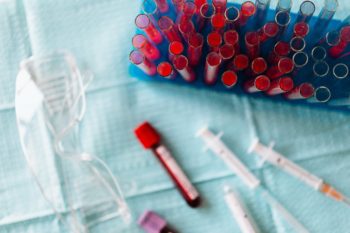A student at the University of Lincoln has opened up about her struggle with lupus, an incurable autoimmune disease that leaves her more vulnerable to COVID-19.

It’s estimated that 50,000 people have lupus in the U.K., but the complexity of the disease means it’s largely misunderstood or unknown to the general public, and goes undiscussed.
Lupus can affect any part of the body, including joints, skin and internal organs, causing pain and tiredness, among other symptoms.
It also leaves the immune system unable to tell the difference between healthy tissues and foreign invaders.
Abbi Brooks-Halling, a third-year student at the University of Lincoln, was diagnosed at the age of nineteen after suffering her first episode at nine years old.
She spoke to The Linc about life with the affliction, and how she has been affected by the ongoing coronavirus pandemic.
In normal circumstances, a person’s immune system protects against infection, but lupus causes it to attack the body’s own tissues and organs.
This makes those with the disease more vulnerable to the novel coronavirus.

“My immune system is already so weak that catching coronavirus could easily end up in a deadly situation for me,” Ms Brooks-Halling said.
“It takes me longer to fight off the normal cold or flu, and I struggle with a lot more than a ‘normal’ person would. Contracting coronavirus would be a massive problem.”
Because of her lupus, Ms Brooks-Halling said she had to shield for far longer than the majority of people, which led to her feeling more isolated.
As people began to venture back outside, she was left stuck indoors.
“I left university earlier than most when the news of coronavirus started. Luckily, my lecturers agreed to let me go home, as it was in my best interest. So, I was actually shielding at home before the country went into lockdown.”
Despite the diagnosis, Ms Brooks-Halling says it’s difficult to confirm the disease, as there’s no set test for lupus.
“It is also harder to diagnose me because I had the worst of my symptoms at the age of 9, which is too young for anything like this to occur – usually,” she said.
In Ms Brooks-Halling case, the main symptom was a flare-up on her face, which everybody assumed was sunburn.
Her mother noticed the skin around her eyes and mouth would go a brown colour, which would scab over and go tight.
Paediatricians hadn’t seen such symptoms in anybody so young before, so she was sent to dermatologists.
“I was always described as a ‘guinea pig’, as they were so desperate to find out what was actually wrong with me,” Ms Brooks-Halling said.
Sunlight can cause symptoms to flare, commonly in the form of rashes, but some people with lupus experience nausea and migraines after being in the sun.
Ms Brooks-Halling explained her worst episode, which occurred after being in the sun, despite wearing a large hat and sunglasses.
“I was around ten years old and, in the night, I woke up and couldn’t open my eyes. I could barely speak for my mouth being so tight, so I had to keep it shut. I was vomiting a lot.
“It was a type of pain I really struggle to explain.”
She began to hate school, embarrassed of the scabs and scars that were settling on her face.
“Lots of people asked what had happened, whilst others stared and assumed it was sunburn – I didn’t know what it was to correct them.
“I carried on struggling and my seat was moved away from the window so the sun couldn’t hit me, as it can happen here in England, through windows too.”
Finally, in 2019, when she was nineteen years old, Ms Brooks-Halling was finally diagnosed with Lupus which came as a “true relief.”
“I felt disappointed that it had taken so long, and exhausted at the amount of hospital trips I had to go to all across England,” she said.
But the relief soon turned to fear when researched lupus online.

“I saw the worst of the worst: how it can cause problems in your brain – seizures and confusion; it can affect your spinal cord; and heart and lungs are known to be inflamed by lupus. This can lead to fluid build-up around them and cause much bigger problems,” she said.
“The biggest fear for me was the problems it can cause with pregnancy. From a very young age, I’ve always wanted to be a mum, so to read these things was terrifying. It still scares me now if I give it too much thought.”
For Ms Brooks-Halling, day-to-day life is “knackering”.
“Some days are much better and some days are much worse. Some days I feel ‘normal’; I wake up at a decent time and don’t struggle with any joint aches or too much fatigue. Other days are much worse,” she said. “Due to the fatigue, I sometimes sleep through my alarms and miss my university lectures.”
“I have once slept through a fire alarm at my student accommodation which could have ended a lot worse than it did – luckily, it was just a drill.”
Sometimes, the fatigue is so severe that she has no choice but to sleep until late in the afternoon, waking only to eat, before falling asleep again.
“It’s easy for other people to think I’m lazy, which I think affects me more than the fatigue itself. I hate for people to think I’m lazy and just simply can’t be bothered to turn up to lectures, when it’s actually that I physically can’t,” she said.
Ms Brooks-Halling said she has had the best support network during her time at the University of Lincoln.
“Luckily, the majority of my lecturers are really understanding,” she said, “which has enabled me to miss lectures or seminars and be filled in with what happened when I’m more up for it.
“I don’t think I could do university without the friends I have,” she added.
Ms Brooks-Halling says all she wants is understanding.
“I don’t want to be pitied. I just want people to tell me it’s okay if today is a day I need to stay in bed.”
She said spreading awareness is very important in helping someone with an invisible disease such as lupus, as people who suffer from these conditions can face unfair judgement.
“The most important thing someone can do to spread awareness is to share a post you might see on social media about lupus and how it affects sufferers,” Ms Brooks-Halling said.
“A share takes two seconds and it will change how little people know of lupus. Most people have hardly heard of it, so shedding some light on lupus will never be taken for granted.”


Hi, I have such a similar story to you took years to finally get a diagnosis. Age 7 to 14 I am now 33. Married and a mum!